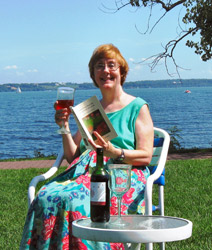Novels by DeWitt, Edugyan Up for Another Major Fiction Prize
The recently-released longlist for Canada's Scotiabank Giller Prize, worth fifty thousand dollars Canadian, has echoes of the Man Booker Prize shortlist. The two Canadian novelists, Patrick deWitt (The Sisters Brothers) and Esi Edugyan (Half Blood Blues), up for Britain's major book prize are also in the running for one of their home country's top literary honors.
Also longlisted for the Giller are:
The Free World by David Bezmozgis (HarperCollins)
The Meagre Tarmac by Clarke Blaise (Biblioasis)
The Antagonist by Lynn Coady (House of Anansi)
The Beggar's Garden by Michael Christie (HarperCollins)
Extensions by Myrna Dey (Nunatak First Fiction)
The Little Shadows by Marina Endicott (Doubleday)
Better Living Through Plastic Explosives by Zsuzsi Gartner (Hamish Hamilton)
Solitaria by Genni Gunn (Signature Editions)
Into the Heart of the Country by Pauline Holdstock (HarperCollins)
A World Elsewhere by Wayne Johnston (Knopf)
The Return by Dany Laferrière (translated from the French by David Homel) (Douglas & McIntyre)
Monoceros by Suzette Mayr (Coach House Books)
The Cat's Table by Michael Ondaatje (McClelland & Stewart)
A Good Man by Guy Vanderhaeghe (McClelland & Stewart)
Touch by Alexi Zentner (Knopf)
Dey's Extensions has already received a Giller honor of sorts, being nominated via public vote for a spot on the longlist. The debut novel had the most nominations out of the roughly four thousand received last month by the Canadian Broadcasting Company (CBC), a sponsor of the Giller. (The CBC is now inviting Canadian residents to select their own shortlists from the semifinalists, for a chance at taking home some literary booty: a Kobo e-reader, a gift certificate to Canadian bookseller Chapters Indigo, and a set of the finalists' books.)
The shortlist will be announced later this fall, followed by the winner ceremony, broadcast by the CBC on November 8.
The video below is a trailer for deWitt's novel, set across the border in the American West of the 1850s.





 I eat my picnic lunch at a table outside the adorable structures (Baby Bear is as big as a child’s playhouse) savoring sunshine and drifting leaves. Spotting a tiny thrift shop across the street, I'm there in a flash. It’s full of almost all new clothes, each item a dollar! Soon, clutching five items, I approach a sweet-faced lady in her 80s who serves as volunteer cashier. Suddenly I realize I've left home with no cash! The thrift shop does not accept credit cards or checks. The cashier tells me I can come back later to pay. "We close at one.” I say, "But I'm doing a poetry reading at the
I eat my picnic lunch at a table outside the adorable structures (Baby Bear is as big as a child’s playhouse) savoring sunshine and drifting leaves. Spotting a tiny thrift shop across the street, I'm there in a flash. It’s full of almost all new clothes, each item a dollar! Soon, clutching five items, I approach a sweet-faced lady in her 80s who serves as volunteer cashier. Suddenly I realize I've left home with no cash! The thrift shop does not accept credit cards or checks. The cashier tells me I can come back later to pay. "We close at one.” I say, "But I'm doing a poetry reading at the